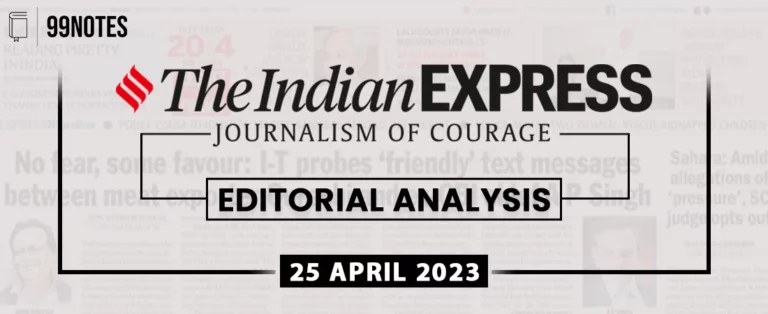17 Feb 2024 : Indian Express Editorial Analysis
Indian Express Editorial Analysis
17-February-2024
1. The MSP fallacy
| Topic: GS3 – Agriculture – MSP This topic is relevant for both Prelims and Mains in the context of broader socio-economic challenges faced by rural communities, including declining incomes, agricultural distress, and the need for inclusive policy interventions. |
| Context: |
|
The Significance of MSP:
- MSP serves as a mechanism to stabilize prices of essential agricultural commodities, shielding farmers from market volatility through government intervention when market prices dip below MSP.
- Despite its existence for over five decades in India, the lack of consistent implementation for all crops has led farmers to demand a legal guarantee.
- While the government annually announces MSP for 23 crops, actual intervention is limited mostly to rice and wheat, occasionally extending to other crops to meet statutory requirements under existing legislation.
Challenges and Misconceptions:
- Despite political consensus on the necessity of MSP, successive governments have hesitated to institutionalize it due to concerns over fiscal implications.
- Exaggerated estimates of the costs associated with MSP implementation have hindered progress, fueled by misconceptions about its operational mechanics.
- The belief that MSP guarantee entails government procurement of all agricultural produce is debunked, as it only applies to a fraction of marketable surplus and intervention is triggered selectively when market prices fall below MSP levels.
Cost Considerations and Subsidies:
- The cost of procuring rice and wheat under MSP is often misunderstood as a burden on the government, whereas in reality, it largely subsidizes consumers rather than benefiting farmers directly.
- For crops beyond the NFSA bundle, government procurement costs are minimal, especially when the government refrains from selling with subsidies.
- In some cases, the government can even profit by selling procured produce at higher market prices, contributing to market stabilization efforts.
Opportunities for Reform:
- While a guaranteed MSP may not solve all farmers’ woes, it presents an opportunity to reform the existing system by diversifying and expanding procurement beyond rice and wheat.
- Regional disparities in agricultural productivity can be addressed through a more inclusive MSP framework, encouraging investment, storage management, and crop diversification.
- Such reforms are crucial for sustainable natural resource management and long-term agricultural stability.
Implications for the Rural Economy:
- The farmers’ demand for MSP reform reflects broader grievances stemming from years of neglect in the agrarian economy, characterized by declining real incomes and wages.
- Despite challenges in estimating the precise cost of MSP guarantee, it is likely to be less than the economic toll of managing inflation.
- Ensuring price stability through MSP not only protects farmers’ incomes but also shields consumers from inflationary pressures, thereby contributing to the overall revival of the rural economy.
Conclusion:
- The renewed protests by farmers underscore deep-seated issues within India’s agricultural sector, with the demand for a legal guarantee for MSP at the forefront.
- Addressing misconceptions, expanding procurement mechanisms, and reforming MSP policies offer avenues for sustainable agricultural growth and rural development.
- By prioritizing farmers’ welfare and ensuring price stability, policymakers can lay the groundwork for a more resilient and equitable agricultural sector.
| Crops Under MSP |
|
| PYQ: What do you mean by Minimum Support Price (MSP)? How will MSP rescue the farmers from the low-income trap? (150 words/10m) (UPSC CSE (M) GS-3 2018) |
| Practice Question: Discuss the significance of the demand for a legal guarantee for Minimum Support Prices (MSP) by farmers in India. Analyze the challenges faced in implementing MSP effectively and suggest measures to reform the MSP system for the sustainable growth of the agricultural sector. (250 words/15 m) |
2. A THOUSAND STEPS BACK
| Topic: GS2 – Governance – Important aspects of governance: Transparency and accountability GS2 – Polity – Judiciary This topic is relevant for both Prelims and Mains in the context of knowing facts about intersection of law, governance, and democratic processes, highlighting the role of the judiciary in interpreting and upholding constitutional principles. |
| Context: |
|
Anonymity of Electoral Bonds:
- Despite criticisms surrounding the anonymity provided by electoral bonds, it serves as a protective shield for donors, safeguarding them from potential backlash or victimization for their political affiliations or support.
- In a democratic society, the freedom to support a political cause or party without fear of reprisal is fundamental.
- The anonymity of electoral bonds promotes a healthier, more inclusive political funding environment.
The Supreme Court’s Judgment:
- However, the recent Supreme Court judgment declaring electoral bonds as ultra vires overlooks these critical benefits.
- By narrowly focusing on the potential for misuse, the Court disregards the broader context and the transformative potential of electoral bonds.
- This ruling not only halts progress but also implicitly endorses a return to the opaque, cash-driven practices that have plagued Indian politics for decades.
Resistance to Reformative Measures:
- The resistance to electoral bonds mirrors the opposition faced by other reformative measures, such as the National Judicial Appointments Commission (NJAC).
- Both initiatives aimed to enhance transparency and accountability within key democratic processes.
- However, the selective acceptance of these reforms reveals a biased approach to transparency, willing to embrace change in certain areas but not others.
Urgent Need for Dialogue and Reframing the Narrative:
- In light of the judgment, there is an urgent need for dialogue among stakeholders to challenge this decision and highlight the potential of electoral bonds to transform political funding.
- The narrative must be reframed to emphasize that the true risk to democracy lies not in the misuse of electoral bonds but in the unchecked flow of black money into the political arena.
- Rather than abandoning the electoral bond scheme, constructive debate is necessary to refine and improve it.
Reaffirmation of Judiciary’s Independence:
- Furthermore, the decision on electoral bonds underscores the judiciary’s autonomy and independence from executive influence.
- Critics alleging the Court’s alignment with the government must acknowledge its meticulous application of the law and constitutional fidelity.
- This judgment serves as a testament to the judiciary’s unwavering commitment to upholding constitutional principles, dispelling accusations of partiality.
Conclusion:
- The Supreme Court’s judgment on electoral bonds should be viewed not only in the context of its immediate impact on electoral financing but also as a reaffirmation of the judiciary’s independence.
- Critics should recognize the nuanced role of the Court in balancing complex legal mandates, free from political allegiances.
- Moving forward, constructive dialogue and reforms are essential to strengthen transparency and accountability in India’s political funding landscape.
| What are the Recommendations on Funding of Political Parties? |
Indrajit Gupta Committee on State Funding of Elections, 1998:
Recommended limitations:
Election Commission’s Recommendations:
Law Commission, 1999:
|
| Practice Question: Discuss the implications of the recent Supreme Court judgment declaring electoral bonds as ultra vires on the transparency and accountability of political funding in India. (150 words/10 m) |
For Enquiry

17 Feb 2024 : Daily Answer Writing

17 Feb 2024 : Daily Current Affairs

17 February 2024 : The Hindu Editorial Notes PDF

17 Feb 2024 : Indian Express Editorial Analysis

17 February 2024 : PIB Summary for UPSC

16 Feb 2024 : Daily Current Affairs Quiz

16 Feb 2024 : Daily Answer Writing

16 Feb 2024 : Daily Current Affairs

16 February 2024 : The Hindu Editorial Notes PDF

16 Feb 2024 : Indian Express Editorial Analysis
mains answer writing 17 Feb 2024 : Daily Answer Writing Mains Answer Writing
17-February-2024
Q1) “The Indian Independence Act 1947 changed the existing constitutional…
Daily Current Affairs 17 Feb 2024 : Daily Current Affairs Daily Current Affairs
17-February-2024- Top News of the Day
1. ED probe finds no FEMA violations in…
Feb 2024 The Hindu 17 February 2024 : The Hindu Editorial Notes PDF The Hindu Editorial
17-February-2024
1. The clear message in the Court’s ‘no’ to electoral bonds.
Topic:…
Indian Express 17 Feb 2024 : Indian Express Editorial Analysis Indian Express Editorial Analysis
17-February-2024
1. The MSP fallacy
Topic: GS3 – Agriculture…
feb 2024 PIB 17 February 2024 : PIB Summary for UPSC PIB Summary for UPSC
17-February -2024
1. Central Consumer Protection Authority (CCPA) seeks public…
Daily Quiz 16 Feb 2024 : Daily Current Affairs Quiz 16 Feb 2024 : Daily Quiz…
mains answer writing 16 Feb 2024 : Daily Answer Writing Mains Answer Writing
16-February-2024
Q1) What is the process for amending the Constitution of India?…
Daily Current Affairs 16 Feb 2024 : Daily Current Affairs Daily Current Affairs
16-February-2024- Top News of the Day
1. Supreme Court Strikes Down Amendments…
Feb 2024 The Hindu 16 February 2024 : The Hindu Editorial Notes PDF The Hindu Editorial
16-February-2024
1. An intervention that will help strengthen legal education.
Topic:…
Indian Express 16 Feb 2024 : Indian Express Editorial Analysis Indian Express Editorial Analysis
16-February-2024
1. Democracy’s guardian angel
Topic: GS2 – Governance…




